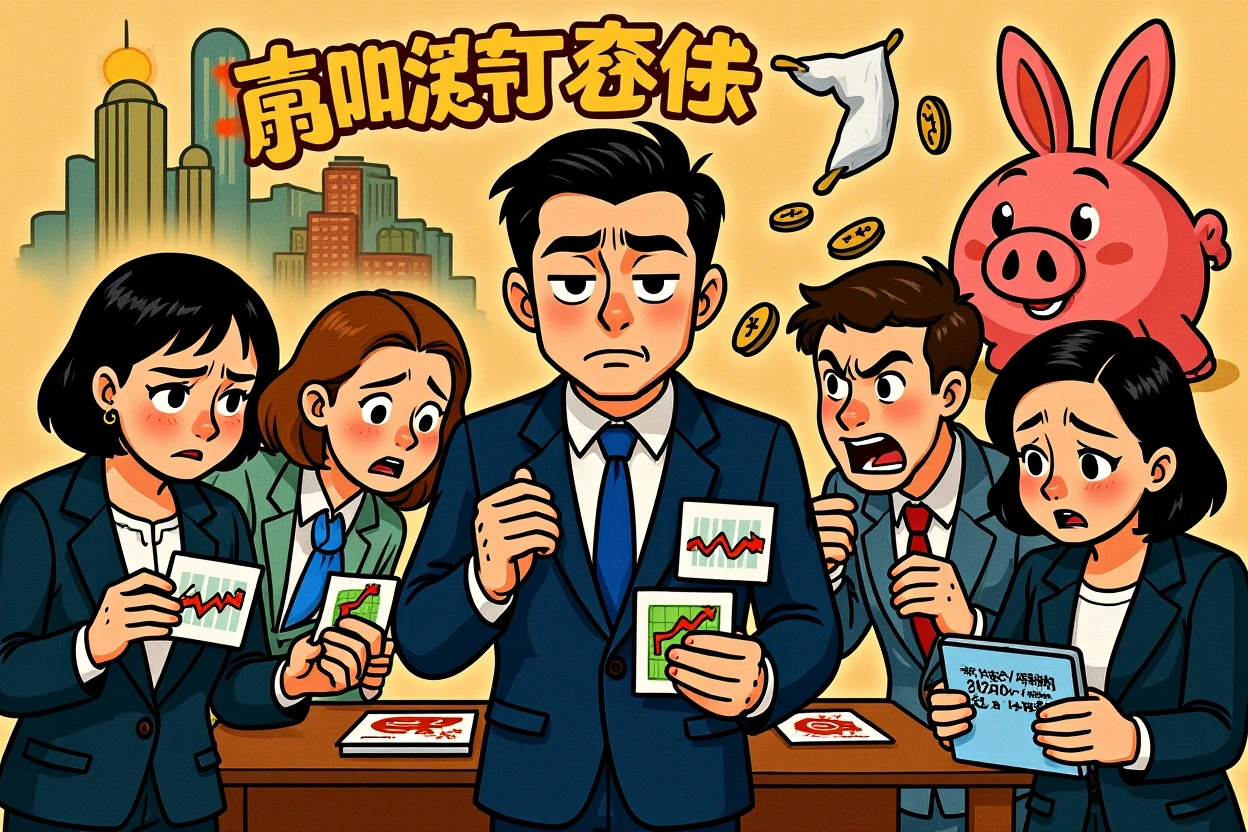Key Developments in the Forced Fund Controversy
Recent revelations have exposed troubling practices at one of China’s major financial institutions:
- Internal whistleblower accuses Shenwan Hongyuan Securities leadership of coercing staff into buying poorly performing funds
- Star manager Jia Chengdong (贾成东) faces allegations of reckless “gambling” with investor capital
- Shenwan Lingxin Industry Select Fund lost 8.23% within weeks while ranking 4672/4673 in its category
- Company leadership under Chen Xiaosheng (陈晓升) faces scrutiny amid declining product launches
- Marketing expenses rise while management fees decline for three consecutive years
Explosive Allegations Surface
A financial industry earthquake struck when an employee leak exposed coercive practices at Shenwan Hongyuan Securities. According to internal communications, staff were pressured by executive Zhang Jian (张剑) to purchase Shenwan Lingxin’s newly launched Industry Select Hybrid Fund during its June 3 debut. This forced fund investment scandal escalated rapidly when employees saw their savings evaporate.
Compulsory Purchases Under Duress
Insider testimony describes how leadership framed the purchases as “political tasks” during mandatory meetings. Zhang Jian (张剑) reportedly promised slow, conservative positioning in high-dividend stocks during the fund’s six-month closed period. Employees allege they were misled about both investment strategy and risk management protocols.
Performance Versus Promises
Contrary to assurances of gradual positioning, fund documents reveal manager Jia Chengdong (贾成东) deployed 60% of capital within three days. The rushed investments targeted consumer stocks at market peaks, immediately triggering losses. Wind data shows subsequent sector-chasing behavior, including ill-timed pivots into banking stocks during market corrections. This forced fund investment scandal highlights dangerous gaps between sales narratives and actual portfolio management.
Manager Under Microscope
Jia Chengdong (贾成东) joined Shenwan Lingxin as deputy general manager in December 2024 after establishing his reputation elsewhere. His previous tenure saw remarkable success managing funds like China Merchants Industry Select with 192% returns. This stark contrast makes his current performance particularly alarming.
Disastrous Track Record Emerges
Both funds under Jia’s management show concerning patterns:
- Shenwan Lingxin Industry Select A: -8.23% return (Rank: 4672/4673)
- Shenwan Lingxin New Momentum A: -6.2% return (Rank: 4491/4573)
Concentration risks appear extreme, with top ten holdings comprising 67.81% of assets and sector allocation reaching 87.61% across just ten industries. The forced fund investment scandal intensifies as investors question whether such aggressive positioning constitutes gambling rather than prudent management.
Employee Backlash Intensifies
Internal communications obtained by Phoenix Finance reveal staff frustration over ignored complaints. “Jia Chengdong is gambling with our money,” one message read. “They insult our intelligence and dignity.” Multiple attempts to contact Shenwan Lingxin for comment went unanswered, deepening the forced fund investment scandal.
Broader Institutional Challenges
Shenwan Lingxin’s struggles extend beyond this single fund. The company has experienced significant manager turnover with five new hires but six departures in the past year. Current assets under management stand at ¥82.6 billion – a figure that’s remained stagnant since 2023.
Concerning Business Trends
Wind data reveals troubling patterns:
- New fund launches plummeted from 17 products in 2022 to just 5 in 2024
- Management fees declined for three consecutive years (2022: ¥487M → 2024: ¥383M)
- Marketing expenses grew from 2.92% to 4.61% of revenue since 2022
Bond funds now dominate the portfolio (59%), while equity products represent under 20% of assets. This forced fund investment scandal emerges against a backdrop of strategic drift at the institution.
Leadership Questions Mount
Chairman Chen Xiaosheng (陈晓升) took leadership in 2021 amid expectations he’d leverage his research background from Shenyin Wanguo Securities. His tenure was supposed to strengthen investment processes, yet the current forced fund investment scandal reveals significant oversight failures. The irony isn’t lost on industry observers that a leader celebrated for research excellence now oversees a manager accused of reckless gambling.
Structural Issues Revealed
This forced fund investment scandal exposes systemic problems in China’s fund industry. Pressure campaigns targeting employees create artificial demand for new products while transferring risk to financially vulnerable staff. The practice appears widespread, with the whistleblower noting: “We’ve consistently lost money on these forced purchases.”
Regulatory Gray Areas
China’s Asset Management Association guidelines prohibit misleading sales practices but lack specific provisions against internal coercion. The forced fund investment scandal demonstrates how regulatory gaps enable institutional abuse. Without explicit prohibitions on mandatory employee investments, firms can continue exploiting staff as captive capital sources.
Performance Accountability Deficits
The case highlights inadequate manager oversight mechanisms. Jia Chengdong’s (贾成东) extreme portfolio concentration and rapid sector rotation occurred without apparent intervention from risk management teams. Shenwan Lingxin’s silence suggests institutions prioritize asset gathering over performance accountability.
Investor Protection Implications
This forced fund investment scandal carries vital lessons for market participants:
- Scrutinize funds with disproportionate internal investments
- Verify strategy consistency through quarterly reports
- Monitor manager concentration risk via Wind data tools
- Question firms with declining new product quality
The situation underscores why investors must demand transparency regarding employee purchase policies and manager oversight frameworks.
Call for Industry Reform
Regulators should consider banning compulsory staff investments and establishing whistleblower protections. Firms must strengthen manager oversight with concentration limits and strategy compliance monitoring. Until reforms address these issues, investors remain vulnerable to similar forced fund investment scandals.
Broader Market Consequences
This controversy emerges as China’s fund industry faces existential challenges. Retail investor confidence remains fragile following years of underperformance. The forced fund investment scandal threatens to further erode trust at a critical juncture for capital markets.
Data from the Asset Management Association of China shows industry outflows accelerated in 2024, with equity funds experiencing particular redemption pressure. Shenwan Lingxin’s experience reflects this broader trend – their equity assets have stagnated despite recent market gains.
Path Forward for Investors
Protect your interests by:
- Reviewing fund holdings through Wind or East Money terminals
- Comparing stated strategies with actual portfolio compositions
- Questioning firms about employee investment policies
- Reporting coercive practices to regulators
The forced fund investment scandal at Shenwan Lingxin serves as a stark reminder that due diligence must extend beyond performance numbers to examine institutional culture and accountability structures. Only through vigilant scrutiny can investors prevent their capital from becoming chips in high-stakes gambling operations.




